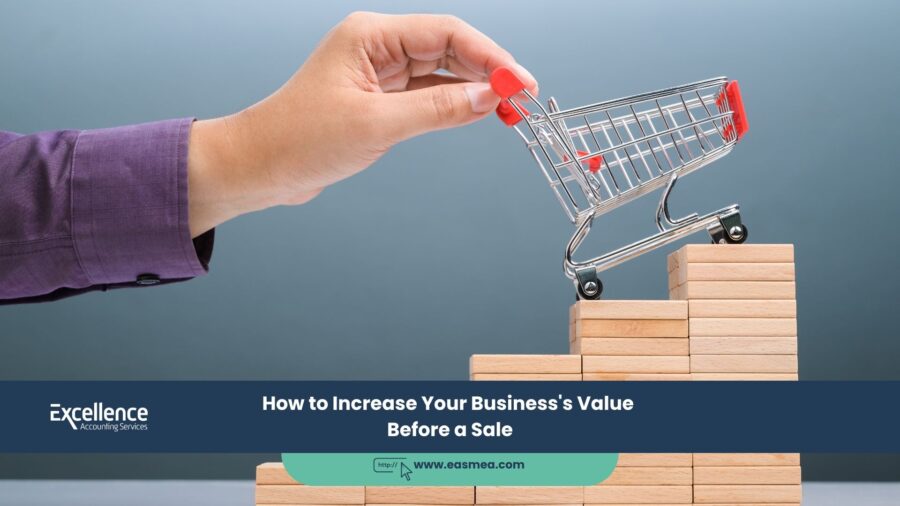How to Increase Your Business’s Value Before a Sale
For an entrepreneur, selling their business is the ultimate financial event—the culmination of years, or even decades, of relentless effort. The final sale price is more than just a number; it’s a reflection of the value, resilience, and potential you’ve built. While market conditions play a role, the most significant factor influencing your company’s valuation is something you can control: a deliberate, strategic effort to enhance its value in the years leading up to the sale.
- How to Increase Your Business's Value Before a Sale
- The Foundation: Fortifying Your Financials
- De-Risking the Business: Building a Resilient Operation
- Crafting the Growth Story
- Maximizing Your Exit Value with Excellence Accounting Services (EAS)
- Frequently Asked Questions (FAQs)
- Are You Building a Business That's Ready to Sell?
Prospective buyers don’t just purchase a company’s past performance; they invest in its future potential and its operational stability. A business that is profitable but chaotic, owner-dependent, and has messy financial records will always command a lower price than one that is slightly less profitable but is well-run, scalable, and transparent. The process of maximizing value is about systematically identifying and strengthening the key attributes that buyers prize most.
This guide provides a strategic roadmap for business owners in the UAE on how to concretely increase their company’s value before a sale. We will cover actionable steps across your financials, operations, and strategy that will not only prepare you for a lucrative exit but will also make your business stronger and more profitable today.
Key Takeaways
- Start Early: Value enhancement is a 2-3 year process. Starting early allows changes to be implemented and their positive results to be reflected in your financial history.
- Think Like a Buyer: Buyers pay for predictable future cash flows and low risk. Every action you take should be aimed at increasing predictability and reducing risk.
- Clean Financials are Paramount: Audited, accurate, and transparent financial records are the foundation of a high valuation. Messy books create doubt, and doubt kills deals.
- Reduce Owner Dependency: A business that can run smoothly without the owner is significantly more valuable. This requires strong systems and a capable management team.
- Demonstrate a Clear Growth Path: Buyers invest in the future. A credible and documented strategy for future growth is essential to justifying a premium valuation.
- Professional Guidance is Key: Engaging experts like CFO services or M&A advisors early can provide the roadmap and discipline needed to maximize value.
The Foundation: Fortifying Your Financials
Before you can enhance value, you must first ensure the value you have is credible and transparent. A buyer’s first look will be at your financial statements. If they are not pristine, the conversation will be short and the offer low.
1. Achieve “Audit-Ready” Financials
Your goal should be to have at least two to three years of clean, audited financial statements from a reputable firm. This is non-negotiable.
- Professional Bookkeeping: Ensure your daily accounting and bookkeeping is impeccable. All transactions must be properly categorized and supported by documentation.
- Regular Reconciliations: All bank accounts and key balance sheet accounts must be reconciled monthly.
- Eliminate Personal Expenses: Stop running personal expenses through the business. Buyers will “normalize” earnings by adding these back, but it signals poor financial discipline.
2. Improve Profitability and Margins
A history of consistent and improving profitability is a powerful value driver.
- Analyze Gross Margins: Scrutinize the profitability of every product line or service. Discontinue or re-price low-margin offerings.
- Control Overhead Costs: Conduct a thorough review of all operating expenses. Negotiate better terms with suppliers and eliminate wasteful spending.
- Implement a Budget: Create a detailed annual budget and regularly compare your actual performance against it. This demonstrates strong financial management.
De-Risking the Business: Building a Resilient Operation
Every perceived risk in your business gives a potential buyer leverage to lower their offer. Your job is to systematically identify and mitigate these risks.
1. Reduce Customer Concentration
If a single customer accounts for more than 15-20% of your revenue, this is a major red flag for a buyer. The risk of that customer leaving post-acquisition is too high.
- Action: Actively pursue new customers to diversify your revenue base. Document this strategy and show the trend of reduced concentration over time.
2. Secure Your Key People
If your business relies heavily on a few key employees (including yourself), a buyer will be concerned about them leaving after the sale.
- Action: Implement employment contracts with non-compete clauses. Consider retention bonuses or other incentive plans that are tied to the successful sale of the business. Most importantly, start cross-training and delegating to reduce dependence on any single individual.
3. Systematize and Document Everything
A business that runs on documented processes is far more valuable than one that runs on the owner’s institutional knowledge.
- Action: Create Standard Operating Procedures (SOPs) for all key business functions: sales, marketing, operations, finance, HR. This proves to a buyer that the business is a well-oiled machine that doesn’t depend on “tribal knowledge.”
A business is a system for creating value. The more you can systematize that system, the more valuable it becomes. A buyer is purchasing the system, not just the owner’s expertise.
Crafting the Growth Story
Buyers pay the highest prices for businesses with a clear and believable path to future growth. You need to not only have a growth plan but also be able to prove it with data.
- Develop a Strategic Plan: Document a 3-5 year strategic plan outlining your growth initiatives. This could include entering new markets, launching new products, or implementing new sales channels.
- Invest in Growth: In the years before a sale, make strategic investments in areas that will fuel future growth, such as marketing, technology, or R&D.
- Track Your Metrics: Use a CRM and other tools to track your sales pipeline, customer acquisition costs, and customer lifetime value. This data provides credible evidence of your growth potential.
Maximizing Your Exit Value with Excellence Accounting Services (EAS)
Preparing a business for a sale is a complex, multi-year endeavor. The strategic financial leadership provided by a CFO is critical to this process. EAS offers the expertise you need to navigate this journey successfully.
- Outsourced CFO Services: Our part-time CFOs act as your strategic partner, developing and executing a comprehensive value enhancement plan tailored to your business.
- Business Valuation: We provide a clear, independent business valuation early in the process, giving you a baseline from which to measure improvement and set a realistic target sale price.
- Due Diligence Preparation: We get your financial house in order and prepare you for the intense scrutiny of buyer due diligence, ensuring a smooth process and preventing last-minute surprises.
- Financial Modeling and Reporting: We build the professional financial models and reports needed to tell a compelling and credible growth story to potential buyers.
Frequently Asked Questions (FAQs)
The best time to sell is when the business is performing well, has a clear upward trend, and you have a credible story for continued growth. You should sell on the way up, not on the way down. Waiting until you are burnt out or the business has plateaued will always result in a lower valuation.
This varies greatly, but it’s not uncommon for a business to increase its valuation by 25-50% or more through a 2-3 year strategic preparation process. The increase comes from both higher profits and a higher valuation multiple that buyers are willing to pay for a de-risked, well-managed company.
Not if they are strategic investments. Buyers will “normalize” earnings by adding back reasonable, one-time growth investments. For example, the cost of implementing a new ERP system or a specific marketing campaign to enter a new market can be explained and added back. These investments demonstrate your commitment to future growth, which is highly valued.
Generally, no. This should be kept confidential among a very small group of key advisors and perhaps one or two essential senior managers who are secured with retention agreements. Announcing a sale too early can create uncertainty and anxiety among employees and customers.
A QoE report is a deep-dive analysis of a company’s financials, usually commissioned by the buyer. Its purpose is to verify the sustainability and accuracy of reported earnings (EBITDA). Having clean, audited financials is the best preparation for a QoE review.
Very important. A clean legal structure (e.g., a well-documented LLC or FZCO) with clear ownership, up-to-date licenses, and solid contracts is essential. A messy legal history or unclear ownership can scare buyers away or significantly delay a deal.
This is a major risk that must be mitigated. You need to start deliberately building the profile of your management team, empowering them to be the experts in front of customers and suppliers. You must also document your processes so the business’s success is tied to the “system,” not to you personally.
Not necessarily. Most deals are valued on a “cash-free, debt-free” basis. This means the Enterprise Value is calculated, and then the debt is subtracted (and cash is added) at closing to arrive at the Equity Value you receive. Having a normal level of operating debt is not usually a problem. Your advisor can guide you on the optimal capital structure.
This is typically handled by an M&A advisor or business broker. They have networks of potential buyers, including strategic acquirers (other companies in your industry) and financial buyers (private equity firms), and can run a confidential process to find the best fit and the highest price.
An earn-out is a portion of the purchase price that is paid to the seller only if the business achieves certain performance targets *after* the sale. Buyers use it to bridge a valuation gap or to ensure the seller is motivated to help with a smooth transition. A seller’s goal is usually to minimize the earn-out portion and maximize the cash received at closing.
Conclusion: Your Exit is the Final Test of the Value You’ve Built
Increasing your business’s value before a sale is the final and most important strategic project an entrepreneur undertakes. It requires a fundamental shift in mindset—from running the business day-to-day to viewing it through the critical eyes of a prospective buyer. By focusing on creating a profitable, scalable, and resilient operation with a clear future, you are not just preparing for a transaction; you are building a better business and securing the legacy you deserve.
Are You Building a Business That's Ready to Sell?
Partner with Excellence Accounting Services to get the strategic financial leadership you need to enhance your company's value and prepare for a successful, profitable exit.




